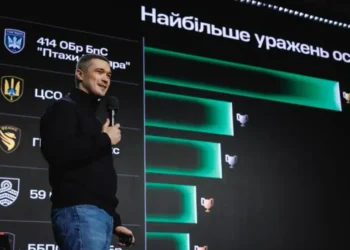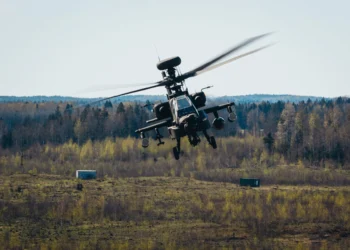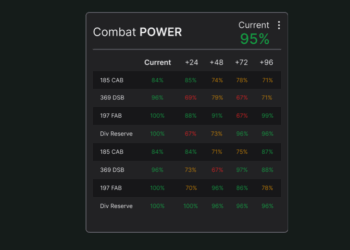Both companies are based out of Berlin, and Pleno, founded in 2023 as a climatetech startup, had raised less than $500,000, mostly from accelerator programs, per PitchBook records. Since its pivot into drone navigation, it has been backed by Nvidia Inception, K.I.E.Z., the Define Defence Accelerator out of Finland, and Spain’s BFAero.
Stark, for its part, is reportedly backed by Peter Thiel and Sequoia although the company has declined to comment on who its backers are and how much it has raised. (PitchBook notes it has raised around $30 million and has a valuation of around $100 million.)
Stark, prior to picking up Pleno, already had a software business: its current product range includes a command and weapons control system (CWC) called Minerva, alongside its AI-guided strike drone, Virtus (also known as OWE-V, short for One Way Effector Vertical Vertical Take-Off and Landing (VTOL), which has Minerva integrated into it. Virtus has already been tested in live-fire conditions in Ukraine – live use being a critical milestone not just for founders but also investors and would-be customers.
So why buy another software company in the form of Pleno? The answer lies in the power of software.
In one sense, software is the more scalable business opportunity since other drone makers can also buy it. But it is also perhaps the most critical one. Drones may have changed how wars are fought, but equally they have also opened the door to a new wave of how the opposition fights back, in the form of jamming and other forms of malicious software hacking.
Pleno’s focus is specifically around building navigation and simulation tools that can work through the attacks made on Global Navigation Satellite Systems (GNSS). It offers two AI-based flight autonomy and simulation tools, PLENO Sim and PLENO Lab.
This is a shift for the startup. Pleno’s focus initially was on making low-cost first-person-view (FPV) quadcopter drones autonomous by combining vision-based navigation, neural network-based computer vision and terminal guidance. However, Lindenberg told Resilience Media that the startup “never saw low-cost unmanned systems as the finish line – it was only the beginning.”
Pleno’s tech will now help contribute to Stark’s work on autonomous drone swarms, particularly Virtus. Its most direct rival, the HX-2 loitering munition, is already advertised as swarm-capable by its maker Helsing, which is backed by Daniel Ek.
“Autonomous flight and swarming have become battlefield necessities,” Lindenberg said. Combined, these can take out large targets without multiple human operators in close proximity. But swarming — where drones fly together like bees — is especially difficult to pull off when communications are jammed and radio links pose major security risks.
Pleno had already secured three pilot projects with a total contract value of €150,000 and over €1 million in its pipeline, according to the company. These are still being followed through post-acquisition.
“Joining Stark allows us to move faster, build deeper, and deliver where it matters,” Lindenberg said in a statement.
The acquisition comes at an interesting moment for Stark. The company was co-founded only last year, in 2024, by Florian Seibel, who is better known as the CEO of Peter Thiel-backed defence tech unicorn Quantum Systems. Seibel, however, is not Stark’s CEO; and despite rumors, neither is Project A founder Uwe Horstmann, according to Stark’s spokesperson.
Lindenberg, a former Bundeswehr member who had gone on to study machine learning and become a software engineer, co-founded Pleno with Indonesia-born Ngurah “Nura” Linggih, a former project manager. It appears that only Lindenberg will be joining Stark; Resilience Media contacted Linggih for confirmation.
The duo’s initial focus was automated carbon measurement with satellite remote sensing; but after they joined Techstars Berlin Accelerator in 2024, they pivoted into AI-enabled drone autonomy. With a new MVP reportedly built by Lindenberg in close collaboration with a Ukrainian AI module manufacturer, Pleno went on to win awards in startup competitions. It is also said to be the second team from EDTH’s Munich 2024 hackathon to get acquired.
Although a number of drone companies have staked their strategies on flexibility, specifically the ability to integrate with other systems, this deal underscores another approach. Vertical integration, in this case where a drone maker’s software and security systems are tightly connected to the device, appears to be part of the main selling point here for Stark.
“The acquisition of Pleno is part of our broader strategy to accelerate momentum in autonomy and AI, and to get cutting-edge technology into the hands of military users now,” said Johannes Schaback, co-founder and CTO of Stark. “Bringing a Berlin-based company into the Stark family reinforces what we’ve always believed: Europe, and Germany in particular, has the talent and infrastructure to deliver the next-generation capabilities NATO and Allied Forces urgently need. We’re proud to help make that a reality.”












